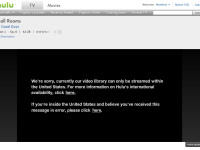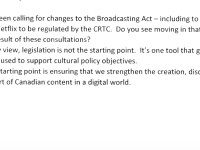As Canadian Heritage Minister Melanie Joly’s consultation on Canadian content in a digital world nears its conclusion – comments are due by November 25th – the big issue remains how to pay for an ambitious culture agenda. Joly has emphasized the benefits of expanding exports, which she hopes will bring foreign dollars and more foreign investment in the sector. While a stronger global presence makes sense, many of the established cultural groups have voiced opposition to measures designed to attract greater foreign participation if it risks reducing the guaranteed Canadian role in productions.
For example, the CRTC’s decision to loosen some Cancon rules has elicited ongoing anger, despite the fact that the change would likely make productions with foreign entities more attractive, thereby enlarging the overall size of the industry in Canada. With similar opposition to market-based reforms designed to reduce dependence on the current system (pick-and-pay television channels, gradual reduction of simultaneous substitution), there is little reason to believe that Joly can count on support for expanded exports to pay the bills.
This post unpacks some of the cultural policy options that have surfaced in recent weeks. The post stems from a panel discussion at the University of Ottawa featuring a paper by Richard Stursberg and commentary from myself, the Globe’s Kate Taylor (who covered the panel here), and ACTRA’s Ferne Downey (Stursberg’s paper is here, full video of the event here).











